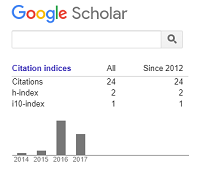Efektivitas Inquiry-Based Learning Terhadap Regulasi Metakognisi Matematika Siswa Sekolah Menengah Pertama Ditinjau dari Gaya Kognitif
DOI:
https://doi.org/10.18592/jpm.v1i2.7591Keywords:
inquiry-based learning, metakognisi, gaya kognitifAbstract
Salah satu keterampilan metakognisi yang penting untuk dimiliki siswa adalah regulasi metakognisi. Regulasi metakognisi terdiri dari aspek perencanaan, pemantauan, dan evaluasi. Namun, masih banyak siswa yang mempunyai regulasi metakognisi sedang. Alternatif model pembelajaran yang dapat digunakan untuk meningkatkan regulasi metakognisi khususnya dalam pelajaran matematika siswa Sekolah Menengah Pertama (SMP) yaitu inquiry-based learning (IBL). Selain regulasi metakognisi, terdapat faktor lain yang dapat mempengaruhi hasil belajar siswa yaitu gaya kognitif. Gaya kognitif dalam penelitian ini terdiri dari gaya kognitif field-independent (FI) dan field-dependent (FD). Oleh karena itu, tujuan dari adanya penelitian ini adalah untuk mengetahui efektivitas IBL terhadap regulasi metakognisi siswa SMP ditinjau dari gaya kognitif. Penelitian ini dilakukan pada 36 siswa dimana terdiri dari 20 siswa FI dan 16 siswa FD. Instrumen dalam penelitian ini menggunakan angket dan GEFT. Analisis data yang digunakan yaitu paired-sample t test. Hasil penelitian ini menunjukkan bahwa nilai signifikansi sebesar 0,000 dimana nilai ini kurang dari taraf signifikansi sebesar 5% atau 0,05 yang artinya terdapat perbedaan yang signifikan antara skor pretest dan posttest sehingga dapat ditarik kesimpulan bahwa IBL efektif digunakan untuk meningkatkan regulasi metakognisi matematika siswa SMP.References
Abdi, A. (2014). The effect of inquiry-based learning method on students’ academic achievement in science course. Universal Journal of Educational Research, 2(1), 37–41. https://doi.org/10.13189/ujer.2014.020104
Amin, I., & Sukestiyarno, Y. L. (2015). Analysis metacognitive skills on learning mathematics in high school. International Journal of Education and Research, 3(3), 213–222.
Chasanah, C., & Usodo, B. (2020). The effectiveness of learning models on written mathematical communication skills viewed from students’ cognitive styles. European Journal of Educational Research, 9(3), 979–994. https://doi.org/10.12973/eu-jer.9.3.979
Handhika, J., Kurniadi, E., & Ahwan, A. (2016). Peningkatan hasil belajar mahasiswa pokok bahasan analisis vektor melalui inkuiri terbimbing. Jurnal Pendidikan Fisika Dan Keilmuan (JPFK), 2(1), 12–15. https://doi.org/10.25273/jpfk.v2i1.20
Ismail, N., Alias, S., & Albakri, I. (2006). Inquiry based learning: A new approach to classroom learning. English Language Journal, 2(1), 13–24.
Izzati, L. R., & Mahmudi, A. (2018). The influence of metacognition in mathematical problem solving. Journal of Physics: Conference Series, 1097(1), 12107. https://doi.org/10.1088/1742-6596/1097/1/012107/meta
Mello, A., & Rentsch, J. (2014). Cognitive style diversity in decision making teams: A conceptual framework. International Journal of Business and Social Research, 4(4), 123–135.
Onyema, E. M., Ogechukwu, U., & Anthonia, E. C. D. (2019). Potentials of mobile technologies in enhancing the effectiveness of inquiry-based learning approach. International Journal of Education (IJE), 2(01), 1–22. https://doi.org/10.5121/IJE.2019.1421
Pedaste, M., Mäeots, M., Siiman, L. A., De Jong, T., Van Riesen, S. A. N., Kamp, E. T., Manoli, C. C., Zacharia, Z. C., & Tsourlidaki, E. (2015). Phases of inquiry-based learning: Definitions and the inquiry cycle. Educational Research Review, 14, 47–61. https://doi.org/10.1016/j.edurev.2015.02.003
Spronken-Smith, R. (2012). Experiencing the process of knowledge creation: The nature and use of inquiry-based learning in higher education. International Colloquium on Practices for Academic Inquiry. University of Otago, 1–17.
Spronken‐Smith, R., & Walker, R. (2010). Can inquiry‐based learning strengthen the links between teaching and disciplinary research? Studies in Higher Education, 35(6), 723–740. https://doi.org/10.1080/03075070903315502
Stephanou, G., & Mpiontini, M.-H. (2017). Metacognitive knowledge and metacognitive regulation in self-regulatory learning style, and in its effects on performance expectation and subsequent performance across diverse school subjects. Psychology, 8(12), 1941. https://doi.org/10.4236/psych.2017.812125
Suarez, A., Specht, M., Prinsen, F., Kalz, M., & Ternier, S. (2018). A review of the types of mobile activities in mobile inquiry-based learning. Computers & Education, 118, 38–55. https://doi.org/10.1016/j.compedu.2017.11.004
Udiyono, U., & Yuwono, M. R. (2018). The correlation between cognitive style and students’ learning achievement on geometry subject. Infinity Journal, 7(1), 35–44. https://doi.org/10.22460/infinity.v7i1.p35-44
Van der Walt, M. S., Maree, J. G., & Ellis, S. M. (2008). Metacognition in the learning of mathematics in the senior phase: Some implications for the curriculum. International Journal of Adolescence and Youth, 14(3), 205–235. https://doi.org/10.1080/02673843.2008.9748004
Wang, M., Zepeda, C. D., Qin, X., Del Toro, J., & Binning, K. R. (2021). More than growth mindset: Individual and interactive links among socioeconomically disadvantaged adolescents’ ability mindsets, metacognitive skills, and math engagement. Child Development, 92(5), e957–e976. https://doi.org/10.1111/cdev.13560
Witkin, H. A., Moore, C. A., Goodenough, D. R., & Cox, P. W. (1977). Field-dependent and field-independent cognitive styles and their educational implications. Review of Educational Research, 47(1), 1–64. https://doi.org/10.3102/00346543047001001
Zahara, R., & Syukri, M. (2020). Promoting inquiry-based learning for science, technology, engineering, math (STEM) to enhance students’ creative thinking skills. Journal of Physics: Conference Series, 1460(1), 12120. https://doi.org/10.1088/1742-6596/1460/1/012120/meta





